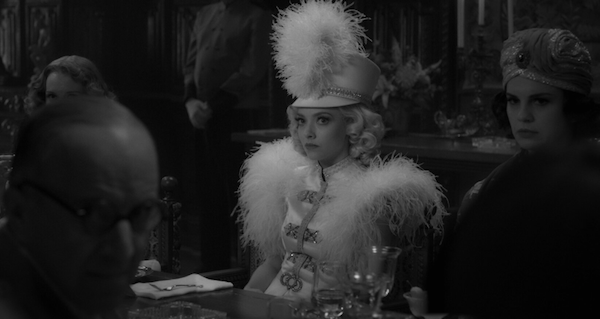Movie review by Greg Carlson
David Fincher lays down plenty of track on the great big electric train set of “Mank,” the filmmaker’s return to the director’s chair after “Gone Girl” in 2014. Depending on one’s interest in the evergreen legend of “Citizen Kane” and the politics of classic Hollywood, mileage may vary, but Fincher’s detailed visual style and an invested performance from Gary Oldman — not to mention the talents of several entertaining supporting players — combine to form yet another purely speculative chapter in the cottage industry of films toying with the mythology of one of the most venerated motion pictures ever made.
Sole screenplay credit on “Mank” is given to Fincher’s late father Jack Fincher. Many have already pointed out that the movie’s focus on Herman J. Mankiewicz erroneously downplays and minimizes the extent to which the script of “Citizen Kane” belonged as much to Welles as it did to Mankiewicz. Traced to Pauline Kael’s controversial — and discredited — essay “Raising Kane,” the rumors favoring Mankiewicz as the real architect of the screenplay known for a time as “American” get another lift here. Tom Burke’s Welles does not loom large.
The presence of and roles for women in this male-dominated industry unfold as one might expect: all of the female characters with speaking parts exist in relation to Mank. Amanda Seyfried’s Marion Davies, in large measure due to the depiction of her surprisingly chummy relationship with the writer, fares better than long-suffering spouse “Poor Sara” (Tuppence Middleton). The film’s most sustained conversation between two women is a literal kitchen sink exchange in which nurse/housekeeper Fraulein Frieda (Monika Gossmann) spills the beans to secretary and scribe Rita Alexander (Lily Collins) that Mankiewicz personally intervened to save a village of one-hundred from Nazi persecution.
Rabid “Kane” devotees will have no problem dismissing the fanciful constructions and historical revisions. Their eyes will feast instead on the multiple “Kane” allusions and rhyming shots, the most obvious of which are built around flashbacks to Mankiewicz’s friendly visits to William Randolph Hearst’s castle in San Simeon. Using digital tools to reconstruct the still jaw-dropping analog techniques advanced by Welles, cinematographer Gregg Toland, and the rest of the talented RKO 281 production team, Fincher maintains his well-established pursuit of technical perfection. He even includes amusingly anachronistic cue marks — which he previously honored in “Fight Club” — to add to the 20th century Old Hollywood verisimilitude.
As biopics go, “Mank” is simply not in the same league as “The Social Network.” In both cases, however, it is the artfulness of great storytelling rather than historically-based journalism that produces the most cinematically satisfying results. The same could be said for Fincher’s only other fact-based feature, “Zodiac.” The secondary plot in “Mank” revolves around the writer’s interactions with powerful men behind desks and next to fireplaces (Arliss Howard is particularly good as an emotional Louis B. Mayer). Landing on the California gubernatorial election of 1934 between conservative Republican Frank Merriam and author Upton Sinclair (the movie doesn’t bother to include third party Progressive Raymond Haight on the leaderboard), “Mank” probably spends more time than necessary defining the protagonist’s own crisis of conscience within the corrupt and decaying dream factory.
